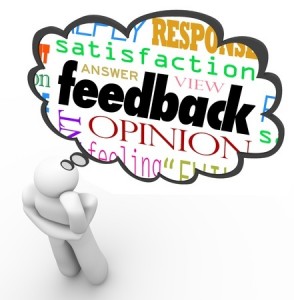By Rose O. Sherman, EdD, RN, FAAN
 Leadership expert Ken Blanchard has described feedback as the breakfast of champions but many nurse leaders will tell you that it can be difficult to swallow. I was recently talking with a leader who told me that staff had reported on a recent satisfaction survey that she had become almost invisible on the unit. Like many nurse leaders in today’s environment, she is spending a great deal of her time in her office working on budget spreadsheets and assessing the achievement of the many performance measures that she is being held accountable for. She acknowledged that she was relying heavily on her assistant nurse manager to manage the day to day interactions with staff. So the feedback on this survey provided important insight into how her behavior is being viewed by staff. The type of feedback received on staff satisfaction surveys can be a social mirror of your behavior and should not be ignored.
Leadership expert Ken Blanchard has described feedback as the breakfast of champions but many nurse leaders will tell you that it can be difficult to swallow. I was recently talking with a leader who told me that staff had reported on a recent satisfaction survey that she had become almost invisible on the unit. Like many nurse leaders in today’s environment, she is spending a great deal of her time in her office working on budget spreadsheets and assessing the achievement of the many performance measures that she is being held accountable for. She acknowledged that she was relying heavily on her assistant nurse manager to manage the day to day interactions with staff. So the feedback on this survey provided important insight into how her behavior is being viewed by staff. The type of feedback received on staff satisfaction surveys can be a social mirror of your behavior and should not be ignored.
The authors of the book Practice Perfect suggest that using feedback takes practice and intentionality. So here are four steps that can be used to improve performance by using feedback that you have been given:
1. Develop a plan to improve
When you have been given feedback such as your lack of visibility on your unit, the first step would be to assess what behaviors or actions would lead to improvement. This is where getting specifics when you are receiving feedback becomes important. Seek opportunities to ask staff directly how you can better support them and be more visible. You may find that it really does not take that much additional time to hold a daily huddle. It could be something as simple as leaving the door to your office open while you work or communicating to staff when you do have a big project that is due.
2. Seek coaching to help hold you accountable
The authors of Practice Perfect suggest that one of the keys to getting people to use feedback is building a culture of tacit accountability. This is where seeking help from a trusted coach who works with you and can observe your behavior is helpful. A coach can watch you in action and often give suggestions about small adjustments in behavior that can make a big difference.
3. Practice the actions
Once you decide on new skills that you want to develop in response to feedback, it is important to get off “autopilot” and intentionally practice the new behaviors. This takes conscious control while you are practicing. If you are working to increase your visibility, you will want to develop specific actions that you will take. Recognize that it could be awkward at first because these are new behaviors for both you and your staff. You may even want to let others know that you are working on your visibility and would appreciate their suggestions.
4. Reflect on the outcomes
When you apply new skills or behaviors, it is important to reflect on their impact. Your interventions may be highly successful but sometimes you may find that your new behaviors are not effective. There may be other skills or behaviors that work better for you.
Using feedback well is something that requires practice and is a different skill than accepting feedback. Most people do get better at doing things with practice. The most highly effective leaders are coach-able. While positive feedback is wonderful, much of our greatest growth will come when suggestions are made to improve our performance.
Read to Lead
Lemov, D., Woolway, E. & Yezzi, K. (2012).Practice Perfect: 42 Rules for Getting Better and Better. San Francisco: Jossey Bass.
© emergingrnleader.com 2014


 LinkedIn
LinkedIn Instagram
Instagram